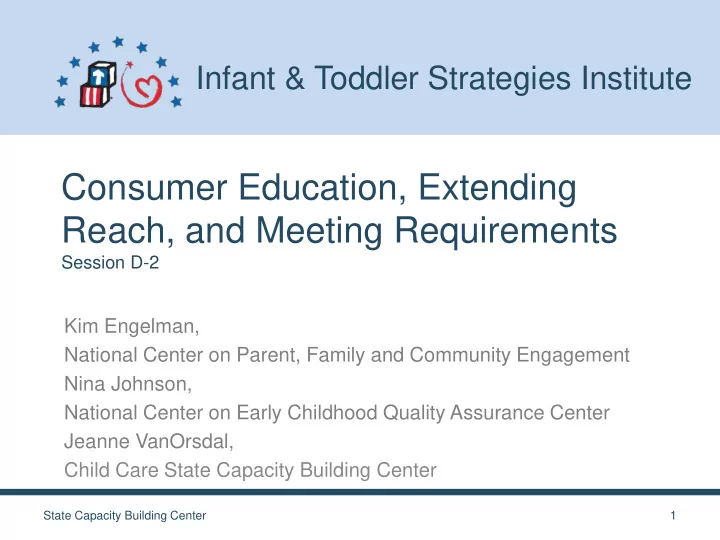

Infant & Toddler Strategies Institute Consumer Education, Extending Reach, and Meeting Requirements Session D-2 Kim Engelman, National Center on Parent, Family and Community Engagement Nina Johnson, National Center on Early Childhood Quality Assurance Center Jeanne VanOrsdal, Child Care State Capacity Building Center State Capacity Building Center 1
Session Goals Identify consumer education needs Exchange strategies Support collective thinking about strategies and partners that can support our consumer education goals State Capacity Building Center 2
Framing this discussion What are your current goals related to dissemination of consumer education resources to ... the general public? parents and families? child care providers? What are the successes you’ve had in consumer education dissemination? What are you still struggling with?
Coming Alongside Families
Key Provisions of the Law Consumer Education on Child Care Options and Quality of Child Care Information on Child Care Assistance and Other Benefits Developmental Screenings Monitoring and Inspection Reports National Toll-Free Hotline and Website Source: Implementing the Child Care and Development Block Grant Reauthorization: A Guide for States, CLASP, 2015 State Capacity Building Center 5
Key Principles Infants and Toddlers Nurturing, in Child Care Need: responsive providers and caregivers they can trust to care for them as they Parents, grow and learn. providers, and Healthy and safe caregivers supported by environments in and linked to which to explore and learn. community resources. Their families to have access to quality options Charting Progress for Babies in for their care. Child Care, Policy Framework Summary, CLASP and Zero to Three, 2011
Quality Child Care for Infants and Toddlers Engaging Families to Make Informed Choices Supply of Care Movement to Higher Quality Care Professional Development of Providers Consultants Coaches
Factors for Consideration Cultural Awareness Linguistic Adaptation Literacy Level Accessibility Multiple Points of Dissemination Adapted from: Implementing the Child Care and Development Block Grant Reauthorization: A Guide for States, CLASP, 2015
Principles Engage families to make choices that support health, learning, and well-being Partner with families by building relationships and understanding their culture Focus on family strengths Respect and support parents as the best first teacher and advocate for their children
Beyond Consumer Education Consumer engagement • Two-way relationship • Co-learning and sharing the right information at the right time Consumer education • One-way information sharing
Engaging Families to Choose Quality Care National Center on Early Childhood Quality Assurance 11
Strategies Helping parents plan Finding child care can be more than a referral Finding child care can open the door to building relationships and planning for a child and parent’s future National Center on Early Childhood Quality Assurance 12
Strategies California’s My Child Care Plan Understand the context Promote informed child care choices Inform parent of subsidized care Inform parents of the range of subsidized care options Provide referrals for other community resources and income supports National Center on Early Childhood Quality Assurance 13
Strategies California’s My Child Care Plan Identify existing resources and support systems Provide free consultation on local early education and child care programs Provide licensing information Create a customized child care plan Encourage parent to provide feedback on their experience National Center on Early Childhood Quality Assurance 14
Strategies Train frontline staff: Oklahoma’s eligibility worker training Empathy training Child care quality training Bridges Out of Poverty training National Center on Early Childhood Quality Assurance 15
Strategies Partner with parents to help other parents Understand the importance of the first few years Navigate the child care system Use state and community resources Select quality child care Empower parents to advocate National Center on Early Childhood Quality Assurance 16
Strategies Support providers to engage families Quality Rating and Improvement Systems Family Partnership and Engagement Standards Strengthening Families • Core training for QRIS participants • Self-assessment and Action Plan • http://www.strengtheningfamilies.net/ National Center on Early Childhood Quality Assurance 17
Activity: What other strategies have you used or could you use in your state to engage families in choosing quality infant and toddler care?
Activity: What other strategies have you used or could you use in your state to promote best practices concerning infant/toddler development?
Infant & Toddler Strategies Institute Reflections and Next Steps State Capacity Building Center 20
Identify 3 strategies that could be used in your state to move to consumer engagement for families with infants/toddlers? State Capacity Building Center 21
Infant & Toddler Strategies Institute Development Information – Infant/Toddler Specific State Capacity Building Center 22
Feeding/Nutrition – Examples Breastfeeding/Formula Support WIC Lactation Consultants Breastfeeding Initiatives Food Allergies Introducing Solid Foods
Physical Development – Examples Immunizations Age-appropriate Tummy Time Safe Sleep Safe Environment Safety/Injury Prevention
Social/Emotional – Examples Relationships Expulsion/Suspension Appropriate Guidance Mental Health Services
Language and Literacy Reading Music Talking 30 Million Word Gap
Developmental Screening Developmental Checklists Developmental Surveillance/Screening Training
Contact Us Jeanne VanOrsdal State Capacity Building Center jeanne.vanorsdal@icfi.com Nina Johnson National Center on Early Childhood Quality Assurance nina.johnson@icfi.com Kim Engelman National Center on Parent, Family & Community Engagement kim.engelman@usa.childcareaware.org State Capacity Building Center 28
National Centers with Relevant Resources Child Care State Capacity Building Center National Center on Early Childhood Health and Wellness National Center on Early Childhood Quality Assurance National Center on Parent, Family, and Community Engagement Tribal Child Care Implementation & Innovation State Capacity Building Center 29
Resources Consumer Education: Full Diversity of Support Services for Families (National Center on Early Childhood Quality Assurance, 2015)https://childcareta.acf.hhs.gov/sites/default/files/public/consumer_education_family_support.pd f Supporting Babies Through QRIS: A Self-Assessment Tool for U.S. States and Other Jurisdictions (Zero to Three, 2015)https://www.zerotothree.org/resources/191-supporting-babies-through-qris-a- self-assessment-tool-for-u-s-states-and-other-jurisdictions Implementing the Child Care and Development Block Grant Reauthorization: A Guide for States (CLASP and National Women’s Law Center, 2015) http://www.clasp.org/issues/child-care-and-early- education/pages/body/Chapter2_CCDBGGuide.pdf Charting Progress for Babies in Child Care, Policy Framework Summary (CLASP and Zero to Three, 2011) http://www.clasp.org/babiesinchildcare The Child Care Development Fund and Workforce Development for Low-Income Parents (Urban Institute, 2015) http://www.urban.org/sites/default/files/alfresco/publication-pdfs/2000308-The-Child-Care- Development-Fund-and-Workforce-Development-for-Low-Income-Parents.pdf Strengthening Families, Program Self-Assessments (Center for the Study of Social Policy) http://www.strengtheningfamilies.net Model Child Care Health Policies (Early Childhood Education Linkage System, Pennsylvania)http://www.ecels-healthychildcarepa.org/publications/manuals-pamphlets- policies/item/248-model-child-care-health-policies Ohio Early Childhood Mental Health (Ohio Mental Health Addiction Services) http://mha.ohio.gov/Default.aspx?tabid=279 State Capacity Building Center 30
Recommend
More recommend